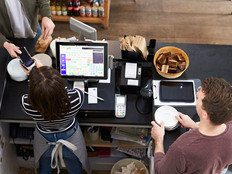Businesses Go Mobile on Multiple Fronts
Because real estate has always been a mobile business, Coldwell Banker Howard Perry and Walston’s rollout of Apple iPad devices to its sales agents was a natural progression, says Greg Robbins, chief innovation and marketing officer for HPW in Raleigh-Durham, N.C.
“Real estate is mobile by nature, and our agents have used technology for years,” Robbins says. “We were one of the first industries to embrace mobile phones, which later led to early adoption of notebooks and mobile printers in our cars.”
In 2011, Robbins learned that the Tampa Bay Buccaneers had given tablets to players so they could view instant replays and review the playbook electronically. Thinking about what it would take to roll out iPads at Coldwell Banker HPW, he worked closely with Chief Technology Officer Chris Walston to get other executives on board. Robbins adds that Don Walston, the realty’s chairman and founder, has always looked for ways to use technology to grow the business and serve customers.
Later that year, Coldwell Banker HPW distributed cellular iPads to nearly 700 agents at a meeting that included presentations from top management and the marketing team, as well as training from Apple and Verizon.
Robbins says the results have been dramatic. Sales increased by 38 percent in 2012, the first full year of the iPad program. And sales for the first half of 2013 are up 40 percent over last year. “The overall real estate market has come back and is up by 20 percent, but we’ve doubled that output,” says Robbins, who attributes a large portion of the company’s success to the mobile device deployment.
The program has transformed the way sales agents do business. For example, when showing homes, they can pull up a map and point out the local schools, parks and shopping. The agent can let the customer use the iPad to take photos and notes and shoot video, all of which they can then email to the customer. And if the buyer finds the perfect home, the agent can submit the offer right from the device.
“The last time the real estate business was good, there were no iPhones or iPads, and social media like Facebook didn’t exist,” Robbins says. “Today, we’re serving a very sophisticated consumer who expects businesses to use technology, so we decided that we needed to be one step ahead.”
Kim Yontosh, HPW’s director of marketing, understands the value of keeping the company’s agents up to date with technology. “We did not simply give all our agents access to the device; we also created an aggressive marketing and training strategy to keep them informed of all the apps that may change their lives and their businesses,” she says.
Chris Silva, an industry analyst for the Altimeter Group, says HPW’s experience doubling sales and working more effectively with customers can be a common outcome of shifting workflow to mobile devices.
The percentage of executives and IT managers who say better communications and knowledge sharing are the primary benefits of mobile technology
SOURCE: “Business Technology Innovation: Six Key Trends in Optimizing IT for Competitive Advantage” (Ventana Research, December 2012)
“What’s stood out to me the past several months is that we’re moving away from caring about the device and are focused more on experiences and services,” Silva says. “People want to access the information that’s critical to them, regardless of screen or location.”
Mobile in the Warehouse
Mobility also takes a high priority at WOW Logistics, a third-party storage and logistics provider based in Appleton, Wis.
WOW’s forklift operators were having trouble communicating with one another in the company’s warehouses using its outdated wireless LAN. “Much of what we do is store food, so there may be 640-pound blocks of cheese stacked up in the warehouse,” says Network Operations Manager Mitchell Huenink. The old LAN made it difficult for workers to use barcode readers and make phone calls.
So over the past year, WOW Logistics implemented about 250 access points from Ruckus Wireless. Performance dramatically improved, and the forklift operators now have an easier time using their Motorola (Symbol) barcode scanners and Polycom SpectraLink IP phones from anywhere in the warehouse. “One of our warehouses is three-quarters of a mile long, and now I can be in the deepest, darkest corner, and it will still be a crisp call,” Huenink says.








